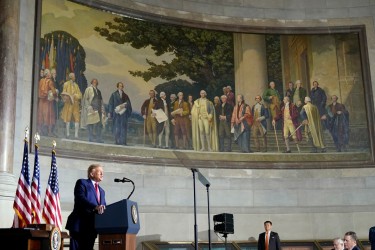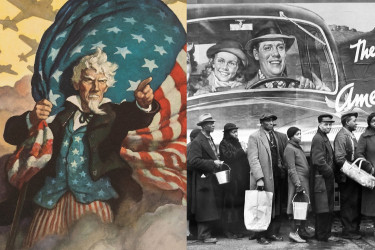As the U.S. began to exercise new power around the world, Morgan set out to show that the protests in the 1760s and ’70s against the Stamp Act and other British policies offered slam-dunk evidence of a founding American consensus on principles of rights. Inherent to the American character, that consensus unified the colonists, he said, inspired the Revolution, and brought about the United States. In the larger context of his work, and the work of similarly minded colleagues, the lesson was that the founding American commitment to rights persisted in postwar U.S. commitments to modern liberal democracy.
The impact of this interpretation was by no means limited to the late 1940s and the 1950s. Historians who built out what Morgan largely began—what became known as the consensus approach—turned early American history into a booming field and made big names for themselves. Born about a century ago, in Morgan’s generation, were Douglass Adair, Daniel Boorstin, Richard Hofstadter, Forrest McDonald, and Bernard Bailyn. Born in succeeding decades were Pauline Maier, Gordon Wood, Carol Berkin, Sean Wilentz, and Akhil Reed Amar, among others. As dissertation advisers for scores of scholars, many of them have held great sway in their profession.
Even more striking is their success in shaping conceptions of the American founding widely held among the American public. That power and some of its complications were seen in recent controversies involving two of the younger members of the group (though not young anymore), Wood and Wilentz. In late 2019, Wilentz organized a letter, also signed by Wood and three other historians, criticizing The New York Times Magazine’s much-discussed 1619 Project, which frames slavery, racism, and Black Americans’ struggles for equality as the key drivers of American history. The signers said the 1619 Project ignored objective historical fact and was steeped in politically influenced bias. In early 2020, Wilentz followed up with an essay in The Atlantic whose title put the issue bluntly: “A Matter of Facts.” Because these objections to the 1619 Project were made not on the basis of a competing framework but on the basis of plain fact revealed by deep expertise, they struck many readers as insurmountable on their face.
That’s how consensus history works. Anyone hoping to explore the depths of America’s not-so-consensus-filled past will run into this presumption, on the part of widely respected scholars, of their superior objectivity as a basis for higher authority. The roots of that presumption can be found in the approach launched by Edmund Morgan about 70 years ago.
It’s true that in scholarly circles, the consensus approach has been subjected to intermittent criticism for years. But it’s been reflected so thoroughly and for so long in museum exhibits, trade publishing, broadcasting, op-eds, and political speeches that its credibility remains unassailable with big segments of the interested public. I think that’s because even those scholars who are critical of the Morgan framing of the nation’s founding haven’t told the public the strange story of its dramatic and at times even unsettling origins.
I first confronted the work of Morgan and his intellectual allies and progeny in 2003. In response to the terrorist attacks of September 2001, I had begun trying to understand something of our nation’s founding history, and amid what was turning out to be the run-up to the Iraq War, I bumped into a half-submerged obstacle, another kind of war, an old one, among historians, with big winners and losers and a lot of dirty fighting. How that war was fought, how it tracked with the rise of U.S. power after World War II, and how its victors came to define acceptable styles for discussing the country‘s founding and meaning: That’s the story I have to tell you now. For it’s the consensus framing that still stands, for so many of us, as the essential truth about America.








